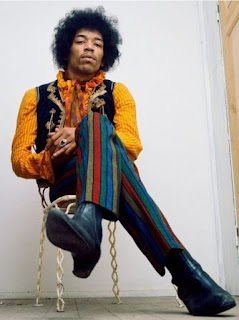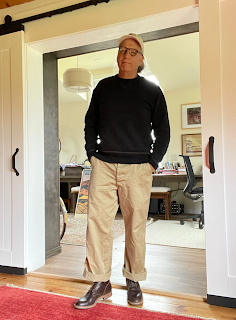Before the Flex: Denim, Boots, Leather Styles in the Great Society
This subject is going to take more than one take. But let's set the stage here.
It’s all such a different scene now. I mean, there actually is a scene. Lots of fellas are interested in boots, denim, leather, vintage militaria, and sometimes Ivy. Social media has accelerated curiosity and helped set the tone, which slides effortlessly between deeply opinionated orthodoxies and a carte blanche of just do you. If it's not always welcoming it does have the advantage of coming through so many cultural lenses that it defies focus, and I say that in a good way. That sense of latitude and extent is different than it was when I got my first Wranglers, stole my first Schott Perfecto, and wore my brother's Beatle boots.
My own relationship to these styles can’t be separated from growing up with them, and how the age was informed by the social realities of post-WWII, and more especially by Vietnam, politics, free speech and social justice movements. No less important was the music we were creating and listening to, because there too style met substance and appearances challenged reality, invention, imagination, and artistry came forward to test, object, and protest convention. Style was politics restated, paraphrased, echoed and refused.
Nowadays I think this particular historical backdrop has none of the determinative value that it did when we put on blue jeans, wore t-shirts under leather, decorated Levi’s jackets, or pulled on boots not just for work. These fashions were statements of the times, dissents, and declarations. They identified you with in and out groups, ‘cause that always happens, but they were very much a part of our social communication. Much of what was happening in fashion was because of the art, literature, and especially in music we listening to. It was all political. It’s hard to impress how closely our sense of style was tied to the age, where lines were being drawn, what it meant to look or speak or listen or act in response to the American Experiment undergoing social revolution.
Where you stood, how you were making yourself, who you wanted to be---all of these things were up for grabs. It’s not like people agreed or that things were much arranged or planned. I wore hand-me-downs from father’s Mad Men 50s wardrobe and stuff from even long before that. I wanted the latest from Carnaby Street or Monterey or the Village. There were vintage and used shops and we scoured them because we could afford that stuff but we were drawing and cutting, refashioning and inventing ourselves from the detritus of a society very much at war with itself.
We were stating our case without knowing where we were going, only knowing we didn’t want their past, present, or future. Everyone’s story about these times is different. Now that it’s fifty some years since I was that teenager, I see how naïve and incapable I was of recognizing just how individual and assorted those experiences were. I don't mean to assume in the least that others had my experience or would interpret it similarly but it might be interesting to those who weren't there to hear one guy's version of the story.
I grew up ten minutes from Manhattan in Jersey in the 60s and 70s. My parents had flourished in the ’50s but like so many emergent middle class folks, their fortunes faded rather than brightened as did others in this era when the ideals envisioning a Great Society were pitted against a costly war in far-away Asia.
My WWII greatest generation parents did their best to maintain appearances, but they were stressed in ways I could feel but didn't fully understand. My siblings were considerably older and had it harder than I, living through these particularly troubled times when the riots were real, the War meant the draft, and world needed changing. Change never comes easy and the status quo more often favors a cowardice of retrenchment and habituation. I was keenly aware of our pressing social issues even though I was a kid because they been brought so very close to home with my siblings but we can leave that for another day.
Being 12 in ’69, I was old enough to be into my brother’s rock n’ roll, captive of his love of cars, girls, counterculture art, literature, and revolution, but also trying to figure myself out---what did I like that wasn’t just his stuff?
To understand the vibe, the clothes, the culture was to follow the music. Everything from fashion to politics and religion was being inflected by music. It cued up the cultural narrative, dividing generations, crossing racial and cultural boundaries, bringing people together and pushing them apart. While it was of course creating tribes, fashions, measuring in and out groups, our boundaries were less defined and possibilities more unfurling as we went along.
Rock n’ roll was the heart of the matter because it had shown itself to be the most inclusive stage, the place where conventions were challenged and horizons of connection revealed. It was crossing boundaries of race, gender, and ethnicity; it was including in unfamiliar ways and still discriminating in the worst ways. There were other scenes like the folkies, embracing civil rights and calling out for the working man, and they'd long been making important social commentaries. This was all well before Reagan spoiled everything by promising to bring back Leave It to Beaver and duping the working guy into believing he didn't need the union to make a fair wage. Politics may be out of fashion but it's never unimportant to understanding what we are wearing inside and out.
For me there was also a re-emergent taste for the blues---with a deep bow to the Brits for getting more young Americans recognizing and appreciating this artistry---and also and particularly the genius of jazz, which was evolving to ever more eclectic and experimental heights. Coltrane was making A Love Supreme. Miles was doing Bitches' Brew. My house in this sleepy little town was only a few miles from where jazz was reinventing sound itself. My friends’ parents were these muscians and that they wore old-school suits and skinny ties that didn’t seem old and were nothing like Robert McNamara. Ivy Style was also revolutionary depending on what music you were listening to and then talking about.
For me, just a few years too young to be drafted but old enough to be party to the party, the cultural tremors in substance were shaped as much in style and form. I can’t really talk about denim, leather, boots, militaria or Ivy without talking about the War, the politics, and the music because the music brought so many different voices to the narrative.
My brother’s world had come from the late 50s, early 60s, and made his own by a taste for Dylan, The Byrds, Beach Boys, San Francisco psychedelia---the Airplane, Quicksilver, and the Dead---and mostly Americana. You could be troubadour and misfit or clean cut and put together. It was the song of the road, beaches and bars. The look was denim, sometimes leather, always the tee underneath, boots if you could afford them but Chuck Taylors otherwise.
I came adding-on much of the British Invasion, which meant The Beatles, The Stones, and then the strange, wonderful worlds of Prog---think earlyearly Genesis, Yes, Gentle Giant, Soft Machine, ELP, and Tull. I parted ways with my brother when I took up with Gabriel costumed as Watcher of the Skies, Anderson playing his flute standing like a stork dressed like a medieval Midlands balladeer, and ELP remaking Mussorgsky.
Prog meant Bowie and the new androgyny. I confess the dress was more than I was willing to take on but I took his point, approvingly.
When Zeppelin showed up in ’69 there was yet another insurgency that shook all known worlds. There'd been Little Richard but now there was Bowie and Robert Plant, and without them I tell you, there'd'a been no Prince. Of course, we also loved mellow---CSN, JT and Cat, Joni, Jackson---but that wasn’t less insubordinate. It too was party to the outbreak. You dressed how you felt and even when you felt all sorts of different ways and dressed for the occasion, it was cool. Somehow the music's message was it all okay for the sake of t
Sometime around 1970 my mom bought me a pair of Wranglers at the Sears Roebuck store in Hackensack. She told me they would shrink, so I should buy them a bit larger in the waist.
We’d take care of the hem later or just roll them up. This wasn’t information unknown to moms and of course we didn't have an internet. I got myself a few flannels, some poly-blend westerns with snaps, and I didn’t wash my jeans because I didn’t really have anything else to wear. I had some which mean khakis and wool, but those were more like dress pants. In those Wranglers I got my first fades, honeycombs, and whiskers not because I was trying but because that’s what happened when you rarely washed them and didn’t own a dryer. We did soak them and had I put them in the refrigerator I'da' gotten a beating. Justly so.
This all happened decades before punk and grunge got into workwear or metal took up with leathers and boots and tattoos. Older styles still found their way if you haunted as I did the NYC jazz scene---we’d switch out from jeans to rob our father’s suit closet, to play the part in the transformation of the Age of Cool happening at Vanguard and Village Gate gigs. They never carded you at the NY jazz clubs.
I always knew that was because we dressed the part. We were kids but we looked like the player's kids. You could be 16 years old and have a seat right up front for the price of a drink per set. Our heroes there were Black Ivy but we just thought that was how they dressed, that it was their scene and we were invited to hang. Playing the part was respectful, natural, nothing you tried to do and nothing you wouldn't do.
So we had a lot to choose from and no particular care for an older generation’s disapproval.
Sorting much of this out through the music may not interest you. Music is always personal. We tend to identify with what we grew up with or what influenced us most as kids. I can see how the current boot and denim scene doesn’t make any of these associations. It’s hardly ever well-received to shout ‘But I was there…’ but I was there and that’s how it went down for me.








Comments
Post a Comment